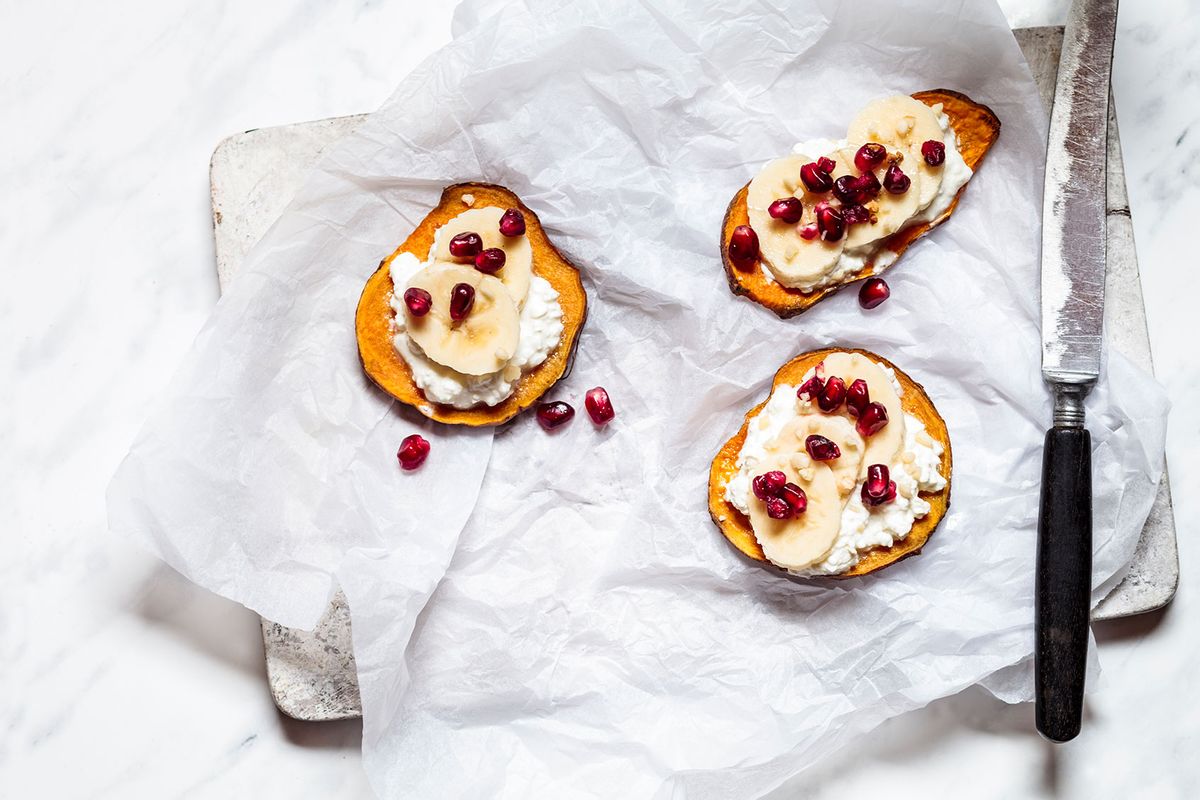It couldn’t be simpler. Cherry tomatoes go into a baking dish with olive oil, salt and pepper — and at the center of it all, a full block of creamy, salty feta cheese. Into the oven it goes to get all melty and roasty and delicious. Then add garlic, fresh basil, and cooked pasta, and you’ve got dinner.
That recipe, originally by Finnish blogger Jenni Häyrinen, took off on TikTok and sparked a feta craze that has affected real-world demand and supply — so much so that the New York Times dubbed the phenomenon “the TikTok feta effect.” Stores couldn’t keep it on shelves and cheesemakers expanded production to keep up. Häyrinen wrote that feta sales went up 300 percent in Finland after she first posted the recipe in 2019.
#FetaPasta has racked up 1.4 billion views on TikTok as of this writing, with droves of users recreating the viral recipe and adding their own twists. As a casual TikTok user, I have watched the yearslong feta obsession and similar fads like the recent unlikely rise of cottage cheese, and wondered: Could the platform’s power to influence food trends help inspire a shift toward more climate-friendly eating? Could a humble vegetable — or better yet, a low-impact, vegan protein or a perennial grain — experience the TikTok feta effect?
TikTok creator Max La Manna is a low-waste, plant-based chef with about 150,000 followers on the platform. I asked him what made the feta recipe so successful and what he thinks about when trying to make his recipes take off on the platform.
“There’s a multitude of different variables that come into play to make a video successful,” La Manna said. One factor he nods to is the ability to capture a viewer’s attention quickly. On TikTok, a user might scroll from a recipe to a makeup tutorial to a montage of funny cats, all in the span of seconds. Creators are trying more and more to hook people in during the very first few seconds of a video, La Manna said. “It’s all these components. It’s the delivery, it’s what’s being filmed, it’s how it’s being filmed.” And, he adds, the personality of the host or creator also plays a big role in how people will respond to a given video.
Cooking videos are, in many ways, perfectly suited to these aspects of TikTok’s ethos. The great appeal of the TikTok cooking video is that it invites you into another person’s kitchen and shows you, in quick-moving steps, exactly how something is made. If that something is an easy, low-effort dish using ingredients you can get at the supermarket — like feta or cottage cheese — all the better. In describing the proliferation of the feta pasta, the New York Times noted that “the videos are just as likely to be made by influencers as by teenagers without large followings.”
Of course, another factor is that the dish in question has to actually be appetizing. When I asked Katie Burdett, a farmer and recipe creator with 350,000 TikTok followers, about the success of the feta pasta, she noted simply, “You know, feta baked down with herbs and tomatoes is really good.” (I’ve tried it. It is good.)
Still, it’s famously impossible to predict, or control, what trend or ingredient or single piece of content is going to go viral. “I’ve been lucky to have many viral videos, and sometimes they’re confounding to me,” Burdett said. One of her most popular formats is ASMR harvest videos. Her recipes haven’t tended to perform quite as well and she suspects part of the reason is that the algorithm likes to see her staying in one lane.
TikTok also has features that can quickly amplify momentum and lift up some surprising things. Copycats and reaction videos or “duets” can turn a minor trend into a sensation as other creators try to piggyback on something that is already working. “When one viewer, one creator sees a video doing well, then they try to spin off of that and make something,” La Manna said. “‘Oh, that cheese video did really well. I’m gonna do something similar that’s using cheese.’” It happens a lot with cooking videos, because creators can also add their own flare to a trending recipe.
In a way, the feta effect may be a combination of creator skill, luck and a volume game. More videos = more chances for one to take off. In that case, the odds of a shortage-inducing craze for a vegetable or other climate-friendly food are rising every day, thanks to the growth of plant-based creators on TikTok — a trend in and of itself.
However, both Burdett and La Manna offered that in hunting for a climate-friendly food sensation, I may be asking the wrong question altogether.
That ability of viral videos to inspire people to try new things is a positive, Burdett believes — and there’s no reason that couldn’t happen for low-impact ingredients. But, she added, as a farmer, she has concerns about the pendulum swing of food trends. Many crops take a long time to grow or produce and farmers often plan several years in advance. If and when a fad fades, it can pose problems for producers, she said. “I hope that there’s not an overcorrection on the side of a maker, then, who … makes a lot of investments in their infrastructure or livestock or all different kinds of things, and then the next year that trend’s over.”
Rather than trying to increase consumption of a particular food, climate-friendly TikTokkers may prefer to help people reduce overconsumption. “I think that I am seeing more of a trend from a lot of the food content creators leaning more in a sustainable direction,” Burdett said.
Many of her recipe videos focus on seasonal eating and how to use up the harvest. That seasonality is one thing that sets fruits and vegetables apart from ingredients like feta — some veggies do, in a sense, go viral when their moment arrives. “That’s mostly when I hear from people,” Burdett said. “‘Oh my God, I have way too much zucchini. And I don’t want it to go to waste, I put all this time and energy and money into growing this and so, like, help.’” She enjoys that back-and-forth with her followers and the opportunity to offer recipes for specific scenarios. “I think that it can be really important to use that platform to give people resources to empower them,” she said.
La Manna echoes that sentiment, and emphasizes the importance of cooking resourcefully and using up what you have — not only to avoid food waste, but also to avoid wasting money. He recently published a cookbook, You Can Cook This!, inspired by two years’ worth of asking his digital community about the ingredients they most often throw away. The book focuses on 30 of the most commonly trashed ingredients, from broccoli stems to bagged leafy greens, and offers recipes to keep them from going to waste. If one of these recipes were to “go viral,” we would never see its ingredients fly off the shelves as feta has done — that’s the opposite of the point.
All that said, if La Manna had to nominate one ingredient to be the next feta, his candidate is stale bread. From breakfast (french toast!) to dessert (bread pudding!), old bread has tons of easy and potentially viral uses that ought to keep it out of the compost bin, he said — it can thicken sauces, it can replace nuts in a pesto, it can even be the base for a hearty and thrifty soup. “Let’s make stale bread sexy.”
A parting shot
Andrée Nieuwjaer, a resident of Roubaix, France, poses in front of her pantry filled with reusable glass jars of staple foods, holding a sponge she made out of potato bags. Nieuwjaer’s household is one of 800 to participate in a program called Roubaix Zéro Déchet or “Zero-Waste Roubaix” — an educational initiative that gives residents tools to reduce their household waste. In a story published today, Nieuwjaer told Grist’s Joseph Winters that she would be eating for free all winter, with imperfect or slightly-past-its-prime produce she sourced for free and then preserved. She estimates that she saves around 3,000 euros a year from her waste-reduction efforts.




Shares